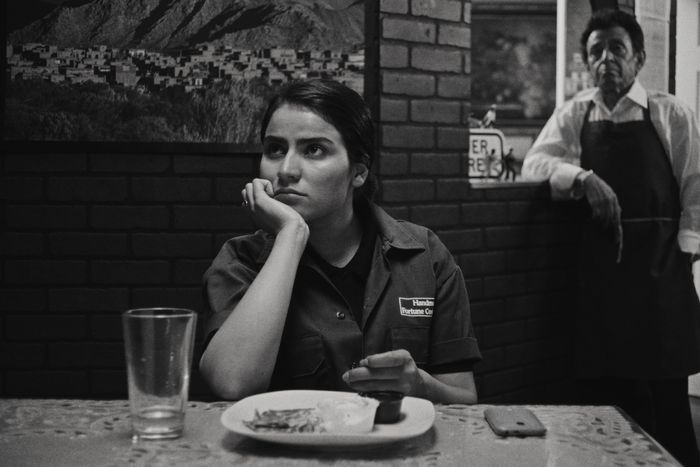
YouÔÇÖll remember Anaita Wali ZadaÔÇÖs eyes. As Donya, an Afghan refugee in the wry and wistful Fremont, the first-time actor is a steadily building wave, a maelstrom of intention and purpose. At times, she does nothing but look or listen as someone offers unsolicited advice, but through her coiled tension, watching and waiting are not passive acts. Take a scene at an Afghan restaurant, where the owner urges Donya to watch a soap opera with him. Director Babak Jalali places the television in front of Donya, and Donya in front of the man, centering her within the layered frame. With every admonishment for her to pay attention, her arms grow stiffer, her expression stonier, her energy bristling. Like the mise-en-sc├¿ne itself, Donya is stratified, caught in between what others want for her and what she wants for herself.
Fremont, which Jalali co-wrote with Carolina Cavalli, is another chapter in the Iranian-British filmmakerÔÇÖs interest in people carving out paths in the nearly forgotten fringes of┬ánationality or identity. His first film, 2009ÔÇÖs Frontier Blues, followed four intertwined stories in IranÔÇÖs northern border with Turkmenistan, and 2016ÔÇÖs Radio Dreams cast the Afghan rock group Kabul Dreams as themselves in a film about a Persian-language radio station in San Francisco; both films used nonprofessional actors in their quietly droll, piercingly observed portraits of overlooked places. International conflicts linger in the backgrounds of these stories (Taliban rule and the U.S. invasion of Afghanistan factor into Radio Dreams, JalaliÔÇÖs third feature Land, and now Fremont), but Jalali is more compelled by how these events trickle into individualsÔÇÖ lives than in which groups or nations are at fault. And in Wali Zada, a former TV presenter and journalist who left Afghanistan with her sister because of the Taliban, Jalali has found someone whose own lived experiences inform her character, a 27-year-old who had to flee her home country and settle in Fremont, California, as a result of her work as a translator for the U.S. Army. (About 89,000 Afghan nationals moved to the U.S. as part of Operation Allies Welcome, with nearly 3,000 settling in Sacramento, Oakland, and other Northern California cities. Some groups estimate that nearly 80,000 other interpreters were left behind after the final U.S. withdrawal in August 2021.)
Donya hasnÔÇÖt quite abandoned her old military routines, regimenting her life into compartments of loneliness: the apartment building she shares with other Afghan refugees; the fortune-cookie factory where she works with women who mostly pass the day in silence; the restaurant where she watches the soap opera with the older male proprietor; the psychiatristÔÇÖs office where she suffers through nearly offensive comparisons between her experiences and those of Jack LondonÔÇÖs fictional dog White Fang. Wali Zada is so still and her face so indecipherable that Donya resembles a specter ÔÇö a ghost haunting what should be her actual life. Jalali emphasizes that isolation with his exclusive use of black-and-white and a preference for static shots of Donya alone in the frame. But in Dari, the Afghan dialect of Persian that Donya speaks to herself and with her neighbors, her name means ÔÇ£world,ÔÇØ and the experience of watching Donya venture out into it is acutely affecting.
Shot in a boxy aspect ratio and with a certain playfulness, Fremont cuts out of its images what it considers irrelevant. DonyaÔÇÖs surroundings are reduced to thin perimeters that allow her to be the sole focus of the frame, giving detailed process scenes, like close-ups of DonyaÔÇÖs hands forming the fortune cookies or back-and-forth dialogue, including a late-night conversation between Donya and her neighbor Salim (Siddique Ahmed), immediacy and presentness. (The film would make a wonderful pair with the similarly themed and visualized Limbo, about a group of asylum seekers waiting on a Scottish island for a decision about their appeals.) Jalali has an eye for how other people observe or ignore their surroundings. He contrasts DonyaÔÇÖs challenging and unsettled stare with the curiosity and openness of more personally resolved, recognizable-to-us faces (Gregg Turkington as the inane therapist Dr. Anthony, actual Bay Area native Boots Riley as a diner at the Chinese restaurant that receives the fortune cookies Donya makes, The BearÔÇÖs Jeremy Allen White as a gently awkward love interest who describes Donya as ÔÇ£AfghanistaniÔÇØ). Divergences build between Donya and the men jostling to be her father figures, and between Donya and the other Afghans around her, one of whom rudely ignores her polite small talk. Fremont says the most, though, when itÔÇÖs communicating all that Donya doesnÔÇÖt voice. Her hushed agitation molds the film with defiance and yearning, breathing life and interiority into its visual extremes.
Translation is really a three-part act: interpreting what someone is saying in one language, choosing how to communicate that information and tone in a different language, and recreating the experience with the limitations inherent in speaking for another person. ItÔÇÖs experimentation and invention at the same time. And as Fremont incrementally moves Donya around the frame ÔÇö breaking out of her centered close-ups into more askew and zoomed-out positions ÔÇö to show her growing certainty of self and her willingness to change her habits, the movie does its own translation of who we think she is versus who she actually is. A moment in the third act so jarringly punctures our assumptions about Donya and our role as witnesses to her self-actualization that Fremont nearly blows itself up. But Wali ZadaÔÇÖs gaze is a form of language, too, and by the end of Fremont, itÔÇÖs her emotional fluency that we all understand.
More Movie Reviews
- Flow Is an Animal Adventure ThatÔÇÖs Endearing and a Little Too Pretty
- Alien: Romulus Gets the Job Done, But at What Cost?
- Blitz Is the Worst Movie Steve McQueen Has Made


